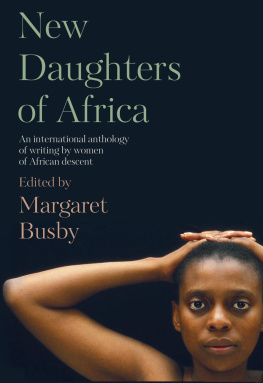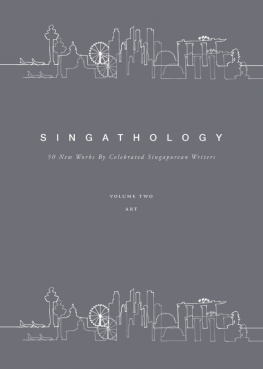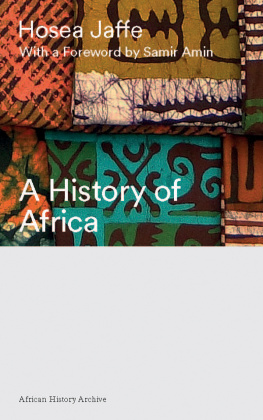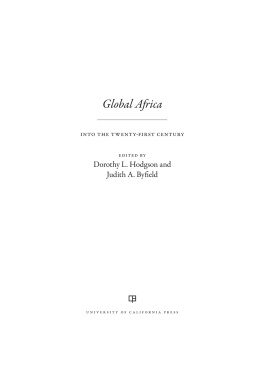What a joy to be introducing New Daughters of Africaa truly collaborative venture that will have an inspiring legacy for years to come! Enabling it to be assembled in record time, writers not only came on board with enthusiasm and alacrity but often steered me in the direction of others whose work they admire, lest these were not already on my radar. Altogether, more than 200 living writers have contributed work to these pagesan amazing party guest list!
A template of sorts was provided by the anthology I compiled more than twenty-five years ago, Daughters of Africa; yet this present volume represents something of a fresh start, since it duplicates none of the writers who appeared in the 1992 collection.
New Daughters of Africa begins with some important entries from the eighteenth and nineteenth centuriesand that a limited number of names represent these periods is not to say that there are not many others whose words could have expanded the early sections; however, these few names serve as a reminder of the indisputable fact that later generations stand tall because of those who have gone before. The chronology continues in the ordering of the twentieth- and twenty-first-century writers who follow by decade of birth, primarily to give context to the generational links.
Beginning this anthology with Nana Asmau
(17931863) signals that there are foremothers who could have occupied a leading place in any era. A revered figure in northern Nigeria, she spoke four languages and was an educated and independent Islamic woman who can be considered a precursor to modern feminism in Africa. In her Lamentation for Aysha, epitomising the depth of connection that at best can be found between sister-friends, she mourns the loss of her lifelong confidante with the words:
Know you not that love, when firmly established, is priceless?
There is no child who could make me forget that love
and no brother, nothing that could soothe me, not even all sorts of riches.
I cry for her with tears of compassion
and of longing and sympathy for her, and loving friendship
Sarah Parker Remond (18151894), abolitionist, lecturer, suffragist and much else, who leads the nineteenth-century grouping, demonstrates many of the themes and serendipitous connections that characterise this collection. A prime example of internationalism, she was born in Salem, Massachusetts (where her father had been brought as a child from the Dutch island of Curaao), and lectured and studied in England before relocating to Italy, where she became a doctor and married. Her letter of September 1866 to the London Daily News, in which she waxes eloquent on the reactionary movement against the coloured race in the United States, and castigates the social commentator Thomas Carlyle for having claims to the gratitude of all negro haters on both sides of the Atlantic, makes one wonder how she might have reacted to a tweet by Donald Trump. Delia Jarrett-Macauleys essay The Bedford Women delves further into her remarkable story, along the way revealing personal links much closer to home.
It gives pause for thought that Elizabeth Keckley (18181907), her life bridging the nineteenth and the twentieth centuries, was describing first-hand the trauma of enslavement in her autobiography Behind the Scenes: Or, Thirty Years a Slave and Four Years in the White House, published in 1868exactly one hundred years before the mould-breaking year that Jarrett-Macauley refers to, when on university campuses from Paris to New York, students were protesting against the old order, against bureaucratic elites, against capitalism, sexism and racism and all forms of authoritarianism, one direct result being the birth of black studies programmes in such places of learning as Cornell, Howard and Harvard. And 1968 would be blighted by the assassination of Dr Martin Luther King in April (later that month MP Enoch Powell gave his notorious Rivers of Blood speech, scaremongering about mass immigration to the UK), and made notable too for the moment when at the Mexico City Olympic Games, African-American athletes Tommie Smith and John Carlos raised their fists in an iconic Black Power salute on the podium after winning medals, watched by, among others, the only black girl in Angela Cobbinahs Cornish village, who recalls: I felt an unfamiliar emotion. Call it connection or kinship, or the bubbling of a youthful rebelliousness
Such connections, and bonds of kinship, actual as well as intuited, strengthen the links between contributors to this volume, and those in my earlier anthology, and those who hopefully will discover themselves in these pages or draw inspiration to continue the legacy in their own ways. There are the literal mother-daughter relationships, beginning here with Josephine St. Pierre Ruffin (18421924) and Florida Ruffin Ridley (18611943). It is especially pleasing to note the emergence as a writer of Yvonne Bailey-Smith, having raised and empowered three children (Zadie Smith and her brothers) to successful careers, and to see Attillah Springer follow the pathway of her mother Eintou Pearl Springer, a contributor to Daughters of Africa, and to see Rebecca Walker, daughter of Alice Walker, achieve prominence in her own right. Exciting, too, to see work from Juliane Okot Bitek and Wanjiku wa Ngg, whose fathers writings I have enjoyed, and illuminating to read the experience of Arthenia Bates Millican (19202012), mentored by a father who was mired in stuckness but taught by Langston Hughes about the value of humor in literature as a means to obliterate the soreness from difficult bruises to the soul.
We each have our individual experiences of the mother-daughter relationship, some of which are shared in these pages, such as Marina Salandy-Browns Lost Daughter of Africa. Recognition of connection to the crucial and indelible maternal spirit is given by H. Cordelia Ray (18521916) in her 1991 poem To My Mother and in Akosua Busias elegiac Mama:
She is the centre of my earth
The fire from which I warm my soul
The spark that kindles my heart.
The sustenance I feed my daughter
Is the nourishment I sucked from her once-succulent flesh
Turned brittle-boned, held together by willpower
Mama feeds me still
Permeating the very personal stories in these pages is always an awareness of the wider world, and of the impact of national and international politics. As well as honouring her mother, Cordelia Ray celebrates the heroic Toussaint Louverture, leader of the Haitian Revolution expelling the French, British and Spanish armies that enforced slavery in Haiti and Santo Domingo. Effie Waller Smith (18791960), meanwhile, both addresses world issues in her poem The Cuban Cause and finds time from the perspective of the first decade of the twentieth century to praise The Bachelor Girl:
Shes no old maid, shes not afraid
To let you know shes her own boss
Of politics and all the tricks
And schemes that politicians use,
She knows full well and she can tell
With eloquence of them her views
She does not shirk, but does her work,
Amid the worlds fast hustling whirl,
And come what may, shes here to stay,
The self-supporting bachelor girl.
(Definitely one of the Independent Women sung about by Destinys Child.)
In many ways 1992 seems longer ago than a quarter-century; yet, while much has changed, many challenges remain to impact on the publication of work by women of African descent. Who imagined in 1992 that we would celebrate the first African-American US president in 2008, and who could have predicted what would follow Barack Obamas achievement, a decade later, on the watch of his successor in the White House? Much more empowering to think of 2018 as the year former first lady Michelle Obama broke records on the publication of her autobiographical memoir










